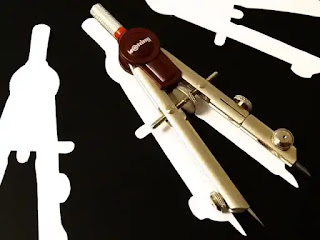Special Types Of First _ Order Equations (Part _2)
Special Types Of First Order Differential Equations (Part_2) :
Standard Form _2 :
Equations not involving the independent variables i.e. equation of the form
f(z,p,q) = 0 ...........(1)
The auxiliary equations for equation(1) are
dx/[∂f/∂p] = dy/[∂f/∂q]= dz/[p∂f/∂p+q∂f/∂q]
= dp/-p∂f/∂z = dq/-q∂f/∂z
∴ dp/p = dq/q
Integrating q = ap ............(2)
Where a is a constant .
Substituting in equation(1) , we have
f(z,p,ap) = 0
Now dz = pdx + qdy ...............(3)
= pdx + apdy
= pd(x+ay)
Let us take X = x + ay
So that dz/dX = p and adz/dX = q .
Hence the given equation becomes
f(z,dz/dX,adz/dX) = 0 ...................(4)
The equation (4) is an ordinary differential equation of first order and can easily be solved . The complete integral is thus obtained by replacing X by (x + ay) .
Examples Related To This Type Of Standard Form :
Example_1 :
Find the complete integral of the equation
p³ + q³ = 27 z
Solution :
Given that
p³ + q³ = 27 z ...........(1)
Let us put p = dz/dX and q = a dz/dX in equation (1) ,
where X = x + ay .
∴ (1+a³)(dz / dX)³ = 27 z
⇒ dz / dX = 3 z^1/3 / (1+a³)^1/3
⇒ z^-1/3 dz = 3dX / (1+a³)^1/3
Integrating , 3/2 z^2/3 (1+a³)^1/3
= 3X + constant
⇒z^2/3 (1+a³)^1/3 = 2(X+c)
⇒ z² (1+a³) = 8(x + ay + c)³
Which is the required solution .
Example_2 :
Find the complete integral of
p²x² = z(z- qy)
Solution :
Given that ,
p²x² = z(z - qy) ...............(1)
Let us put
u = log x
and v = log y ,
Then p = ∂z/∂x
= ∂z/∂u . ∂u/∂x = 1/x ∂z/∂u
and q = ∂z/∂y
= ∂z/∂v . ∂v/∂z = 1/y ∂z/∂v
Substituting in equation (1) , we get
(∂z/∂u)² = z(z- ∂z/∂v)
or P² = z(z - Q) [standard form 2]
...........(2)
where P = ∂z/∂u and Q = ∂z/∂v
Now replacing P by dz/dX and Q by adz/dX ,
where X = u + av , we get
(dz/dX)² = z² - za dz/dX
⇒ (dz/dX)² + az dz/dX - z² = 0
⇒ dz/dX = -az ± √(a²z²+4z²) / 2
= z/2 [- a ± √(a²+4)
⇒2/z dz = [-a + √(a²+4 ) dX
[taking +ve sign].
Integrating ,
2 log z = [-a + √(a²+4 )]X + 2 log c
= [-a + √(a²+4 )](u+av) + 2 log c
= [-a + √(a²+4 )]log x
+ a[-a + √(a²+4 )]log y + 2 log c
= 2 A log x + 2(1-A²) log y + 2 log c
where 2A = - a + √(a² + 4 )
∴ z = cxᴬy^(1 - A²)
Which is the required solution .
These are some problems which better explain the standard form .
"Tough Times Don't Last"
Tough People Do!













Comments
Post a Comment
If Any Doubt Ask Me